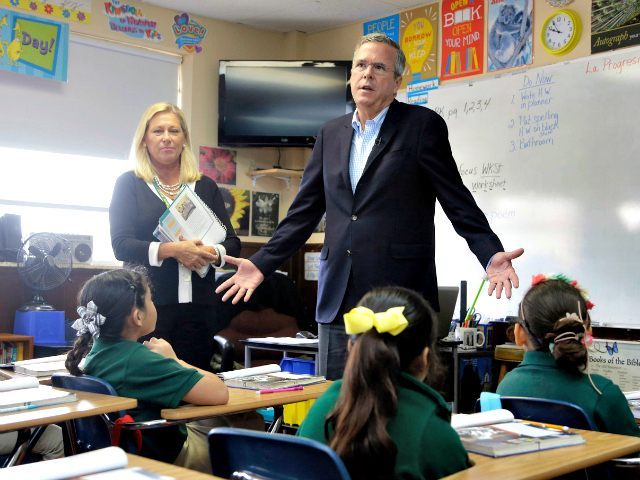Republican presidential contender Jeb Bush announced his “budget neutral” education plan on Martin Luther King Jr. Day, as he also lamented income inequality, asserted that education is a “civil rights issue,” and advocated for more opportunities for pre-K education for children of low-income families.
At the same time, while Bush invoked the talking points of the Common Core state standards—the federally-funded education reform that he championed for years—he failed to mention it by name in his plan.
In his “Blueprint for a 21st Century American Education System”—posted on Medium—Bush writes:
Too many low-income students start kindergarten already years behind their more affluent counterparts. Only one-third of students graduate high school prepared for college or a good career. And our higher education system has become too expensive for many Americans to afford. To achieve equal opportunity and increased economic growth, we must provide every child the skills and knowledge necessary to succeed in the increasingly competitive 21st century global economy.
“As the nation honors Dr. Martin Luther King and his legacy today, I firmly believe that ensuring every individual has access to a quality education is the great civil rights challenge of our time,” he said, pointing out that his plan requires “a complete overhaul of a system from one that serves bureaucracies to one that serves the needs of families and students…”
Though Bush urged states to sign on to the Common Core standards in exchange for a shot at federal stimulus dollars and waivers from the onerous No Child Left Behind federal law, the founder of the Bill and Melinda Gates Foundation-funded Foundation for Excellence in Education (FEE) says his education plan is built on “four conservative principles”:
1) education decisions should be made as close to the student as possible
2) choice of all kinds should be expanded
3) transparency is essential to accountability
4) innovation requires flexibility
During the years Bush was campaigning for Common Core, he repeated the talking points that the reform was “state-led,” and that local school districts could still set their own curriculum, even though the Common Core-aligned tests—developed by federally-funded test consortia—would determine the curriculum since both students and teachers would be evaluated based on students’ performance on Common Core tests.
Bush writes he will “leverage the limited role of the federal government to improve all schools” through an expansion of school choice by doubling support for charter schools, strengthening the D.C. Opportunity Scholarship Program—which is a school voucher system—and allowing federal dollars to follow the child—also known as “portability.”
The devil is in the details, however, since—while some charter schools are effective in achieving student success—others have been examples of cronyism and corruption as a result of arrangements between politicians and private businesses. And while “portability”—i.e., when taxpayer funds, known as a “voucher,” for a child’s public education follows a child to the private school of his or her choice—sounds “conservative,” the reality is that it is not only the money that follows along with the child, but also increased government regulation. For some years now, conservative and libertarian education policy experts have warned against voucher systems in favor, instead, of tax-credit scholarships and education savings accounts, which are less likely to drag the regulations and mandates of government schools into the private arena.
Ironically, Bush claims to want to tamp down on federal intrusion in academic standards, curriculum or content.
“Right now, too many regulations drown the system in compliance costs, wasting valuable resources,” he writes. “We need to give states the flexibility to reform and innovate to meet the unique needs of their students.”
“Portability,” through vouchers, however, could bring further regulations into private and religious schools. And with Bush’s past advocacy for Common Core, conservatives will find it hard to envision him as a presidential candidate who would be fighting for less regulation.
Teachers’ unions and liberals in general, on the other hand, are against school choice and vouchers for different reasons—mostly informed by their desire to keep federal funding flowing into public schools and public school teacher jobs.
Bush writes he hopes to drive down college costs by creating “state databases so every student can see the average unemployment rate, earnings, graduation rates and debt repayment rate of programs they are considering.”
“We need students to be able to judge the cost and quality of programs so they can make better choices and hold schools accountable,” the GOP contender writes, and—once again—while the idea sounds like it would create a sense of competitiveness among colleges and universities, the creation of “state databases” is likely to be a concern for many parents that their children’s private data will be part of the mix.
For prospective college students, Bush plans to stem student loan debt by giving all high school graduates access to a $50,000 line of credit through an education savings account to pay for college and career training.
“For every $10,000 spent, students would repay 1 percent of their income for 25 years,” Bush proposes, and also includes a plan for those in debt now to allow that debt to be “discharged in bankruptcy,” with the possibility of extended repayment periods.
“I know what needs to be done,” Bush asserts. “As governor of Florida, I increased student achievement across the board, particularly for those most at risk, and as president, I will do the same.”

COMMENTS
Please let us know if you're having issues with commenting.